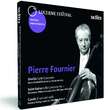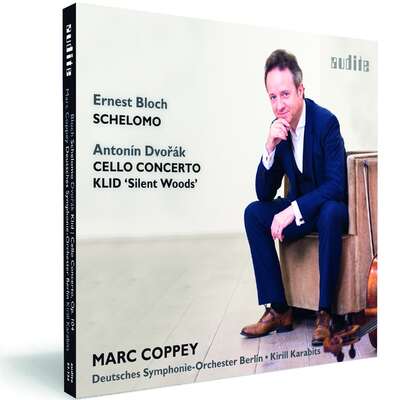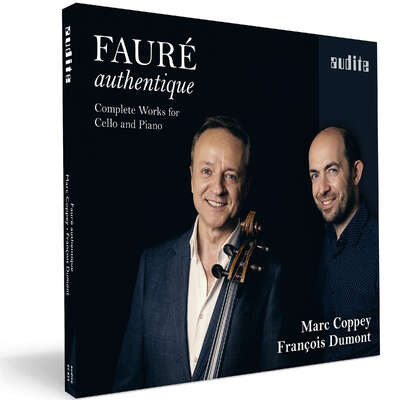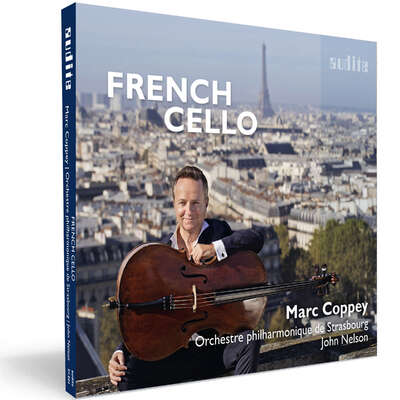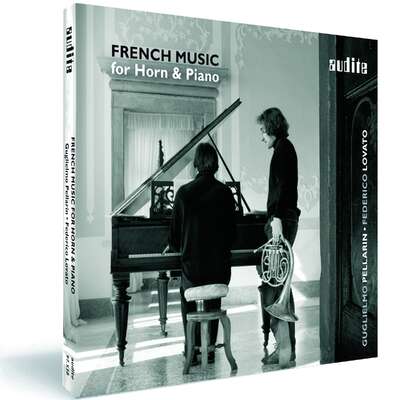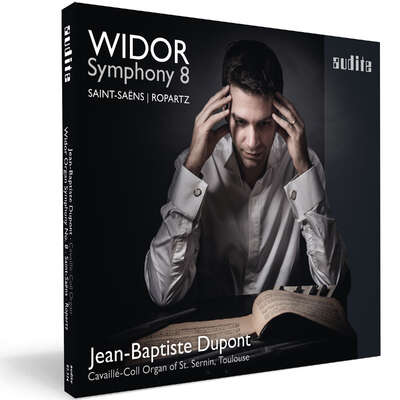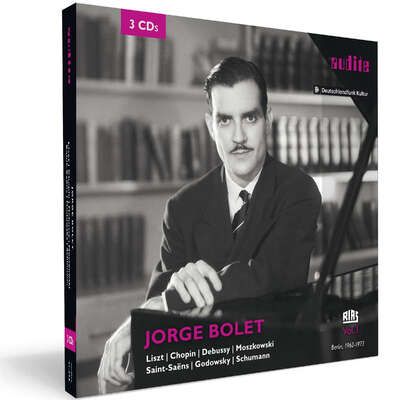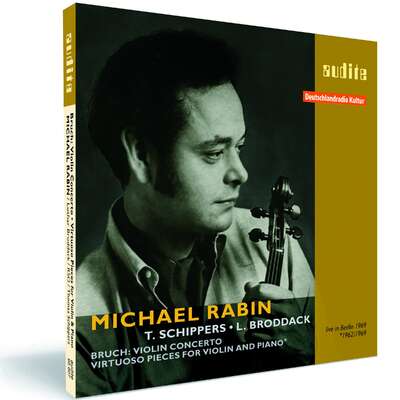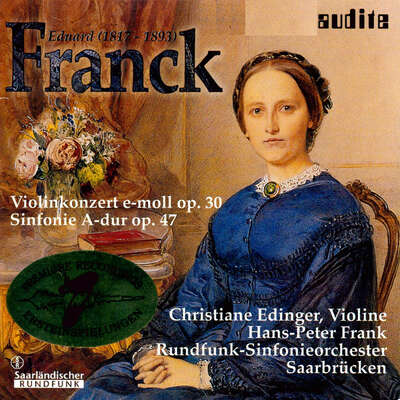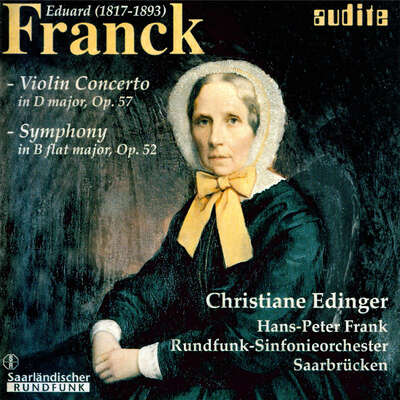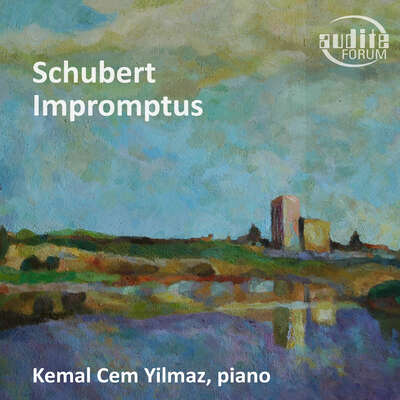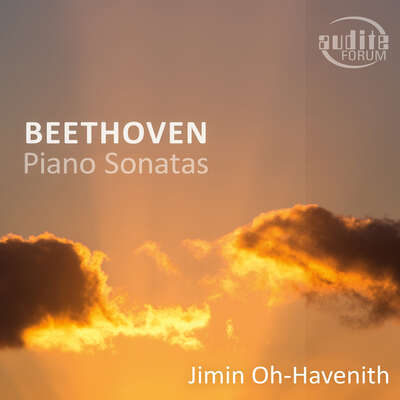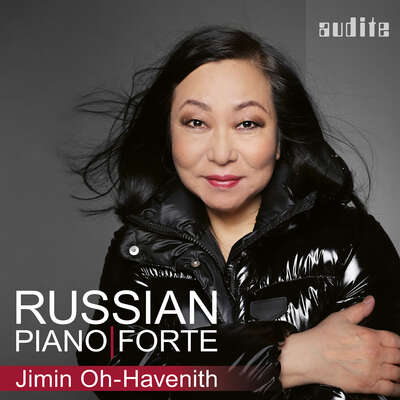
Als «Aristokraten des Cellospiels» hat man Pierre Fournier gepriesen: Sein beseelter, singender Ton, seine schnörkellose Eleganz und sein Klangraffinement zeichnen auch seine nun erstmals veröffentlichten Luzerner Live-Mitschnitte aus. Ein besonders denkwürdiger Archivfund: Fourniers Begegnung mit dem grossen Dvořák-Dirigenten István Kertész, der dessen Cellokonzert vor seinem allzu frühen Tod nicht mehr im Studio einspielen konnte.mehr
"Fournier digs deeper in the Dvořák than many other cellists bringing us one of the finest performances now on record. Even before hearing the Saint Saëns concerto I had decided that this is a Dvořák to put alongside the best on my shelves." (The Classical Reviewer)
Details
|
Pierre Fournier plays Dvořák, Saint-Saëns and Casals
LUCERNE FESTIVAL Historic Performances, Vol. VII |
|
| Artikelnummer: | 95.628 |
|---|---|
| EAN-Code: | 4022143956286 |
| Preisgruppe: | BCB |
| Veröffentlichungsdatum: | 27. Februar 2015 |
| Spielzeit: | 60 min. |
Zusatzmaterial
Informationen
Pierre Fournier (1906-1986) war einer der bedeutendsten Cellisten der Generation nach Pablo Casals. Er wird wegen seines beseelten, singenden Tons, seiner schnörkellosen Eleganz und seines Klangraffinements als «Aristokrat des Cellospiels» gerühmt. Die vorliegende CD vereint als Erstveröffentlichungen drei Live-Mitschnitte von LUCERNE FESTIVAL. Mit István Kertész brachte Fournier im Sommer 1967 ein Kernstück seines Repertoireszur Aufführung: Antonín Dvořáks Cellokonzert in h-Moll op. 104 - einbesonders denkwürdiger Archivfund, denn der große Dvořák-Dirigent Kertész konnte das Werk vor seinem allzu frühen tragischen Tod nicht mehr im Studio einspielen. Der Live-Mitschnitt bewahrt den unberechenbaren, emotionalen Mehrwert der Konzertsituation: Fournier und Kertész gehen volles Risiko,bevorzugen die Scharfzeichnung des Trennklangs sowie frische Tempi und sindweit davon entfernt, dem Taumel folkloristischer Seligkeit oder trübsinniger Sentimentalität zu verfallen. Camille Saint-Saëns' Erstes Cellokonzerta-Moll op. 33 wurde jahrzehntelang gering geschätzt, obwohl Komponisten wie Rachmaninow oder Schostakowitsch es zum «größten aller Cellokonzerte» erklärten. Erst in den 50er und 60er Jahren wurde es wiederentdeckt - nicht zuletzt durch die Fürsprache Pierre Fourniers. 1962 gelang ihm mit Jean Martinon am Pult des Orchestre Philharmonique de la RTF eine leidenschaftliche Interpretation, die einen aufschlussreichen Vergleich mit seiner Studio-Einspielung erlaubt. InKooperation mit audite präsentiert LUCERNE FESTIVAL herausragende Konzertmitschnitte prägender Festspielkünstler. Ziel der Edition ist es, bislang weitgehend unveröffentlichte Schätze aus den ersten sechs Jahrzehntendes Festivals zu heben. Die Tondokumente stammen aus den Archiven von SRF Schweizer Radio und Fernsehen, das die Luzerner Konzerte seit Anbeginn regelmäßig überträgt. Sie werden klanglich sorgfältig restauriert und durch Materialien und Fotos aus dem Archiv von LUCERNE FESTIVAL ergänzt: eine klingende Festspielgeschichte.
Ein Novum in Fourniers Diskographie ist dagegen der Cant dels ocells, den er 1976 in einem Gedenkkonzert zum 100. Geburtstag von Pablo Casals interpretierte - zugleich sein letzter Auftritt bei den Luzerner Festspielen. Die kurze Ansprache Fourniers, die er im Konzert vor diesem Werk hielt, wurde aus dokumentarischen Gründen mit in die Veröffentlichung aufgenommen. Fournier würdigt in ihr sowohl Pablo Casals, der das katalanische Weihnachtslied zum obligaten Bestandteil seiner Konzerte und zur heimlichen Hymne aller Flüchtlinge und Emigranten machte, als auch den Cellisten und Komponisten Enrico Mainardi, der kurz zuvor am 10. April 1976 verstorben war.
Besprechungen
www.concertonet.com | 04/16/2016 | Sébastien Gauthier | 16. April 2016
C’est une tornade musicale, tornade accrue par l’urgence du live sous la direction étincelante de Jean Martinon, chef avec lequel Fournier avait pourtant déjà gravé une fort belle version en 1960 à la tête de l’Orchestre Lamoureux pour les micros de Deutsche Grammophon. [...] Quelle prestation! Les compléments sont du même niveau, à commencer par ce Second Concerto de Dvorák avec l’accompagnement idoine de l’Orchestre du Festival de Lucerne dirigé par István Kertész, connaisseur ô combien avisé du compositeur tchèque. [...] Enfin, annoncé par Fournier lui-même à la «mémoire impérissable» de Pablo Casals, c’est Le Chant des oiseaux dans un arrangement pour violoncelle et orchestre à cordes écrit par Casals lui-même: superbe moment qui conclut de la plus belle manière un disque indispensable pour tout amoureux de Pierre Fournier.Mehr lesen
Crescendo Magazine | Le 24 septembre 2015 | Bernard Postiau | 24. September 2015 Pierre Fournier au sommet de son art
En bref, un disque à consommer sans modération et qu’on écoute avec une émotion de tous les instants et une admiration sans bornes.Mehr lesen
American Record Guide | September 2015 | Donald R Vroon | 1. September 2015
The two concertos were recorded for DG a few years before these Lucerne Festival appearances. The Saint-Saens was recorded around 1960 for DG; thisMehr lesen
You would expect a concert recording like this to be less than ideal in sound but perhaps more spontaneous. But there’s no predicting. The Saint-Saens sounds simply wonderful, and Martinon’s conducting is simply great. But the Dvorak is clearly inferior in sound to the DG—both cello and orchestra. And Istvan Kertesz was a fine conductor, but I’m afraid he is completely outshone by George Szell on DG, who has incredible fire and precision, who makes every moment and every instrument shine. If you have the DG Dvorak you certainly don’t need this. You might think a performance before an audience would be more exciting, but I assure you that Szell conducting this puts everyone else in the shade—and it’s the Berlin Philharmonic, too! The sheer quality of the orchestra is unbeatable. After all, this recording is simply the festival orchestra—unlike the Saint-Saens, which has the superb French Radio Orchestra under a great French conductor.
A four-minute encore is added (introduced by Fournier, whose French is as elegant and refined as his playing): the Pablo Casals ‘Song of the Birds’.
Schwäbische Zeitung | Samstag, 22. August 2015 | man | 22. August 2015 Luzern gestern und morgen
Die Luzerner Festspiele bringen eine Reihe mit Aufnahmen aus ihrerMehr lesen
Fanfare | 11.08.2015 | Jerry Dubins | 11. August 2015
Pierre Fournier (1906–1986) has been called the “aristocrat of the cello,” and these recordings, remastered from original archival tapes ofMehr lesen
Fournier was recorded many times in Dvořák’s B-Minor Concerto; at least 14 according to his complete discography at fischer.hosting.paran.com/music/Fournier/fournier_discography.htm. Best known among them, however, has long been his 1962 version for Deutsche Grammophon with George Szell and the Berlin Philharmonic.
The liner note to the current Audite release points out that this archival recording of the Dvořák with Fournier and István Kertész is of additional historical interest, due to the fact that the conductor’s tragically early death prevented him from making a studio recording of the Concerto. I’m not sure exactly why that imparts special historical value to this release. Kertész was a splendid conductor—his Dvořák symphony cycle with the London Symphony Orchestra is still highly regarded—but if you check the above-cited Fournier discography, you’ll find that a majority of the cellist’s recordings of the Dvořák Concerto come from live performances and/or radio checks, and are with other well-known conductors who, as far as I know, never made studio recordings of the piece either, whether with Fournier or any other cellist. Besides, even if Kertész had made a studio recording of the Dvořák, either with Fournier or someone else, it’s hard to imagine it surpassing this one for febrile urgency.
It’s interesting to compare this performance with the familiar Deutsche Grammophon Szell recording. Fournier/Kertész: 14:39, 10:59, 11:30; Fournier/Szell: 14:49, 11:28, 12:28. In every movement, Fournier/Kertész are faster; not by much in the first movement, and by only a bit more in the slow movement, but look at the last movement—just two seconds shy of a full minute’s difference. It’s not just the tempos, though, that make this performance so exciting. It has about it a feeling of risk-taking and ardency that the cooler Szell lacks. Maybe that’s attributable to the presence of a live audience, but despite the electricity Kertész and Fournier generate, control is not compromised by conductor or soloist. Fournier sings forth with his ever bright, blue-blooded tone, poised technique, and nobility of expression; while Kertész whips up the Swiss Festival Orchestra’s players to a fevered pitch and then moves them to caress the solo cello in a lullaby of soft, sweet embraces.
In prior reviews of Dvořák Cello Concerto recordings, I admit that I’ve questioned its popularity, wondering if it really was that great a work, compared, for example, to Elgar’s Cello Concerto. All I can say is that, hearing this recording of the Dvořák with Fournier and Kertész, now I understand. If you never acquire another recording of the work, this is one you must hear and have; it’s breathtaking.
To be honest, the Saint-Saëns Concerto doesn’t rise to the same level. There are a couple of questionable moments in the intonation, and Fournier doesn’t sound quite as technically secure in this 1962 performance as he does in the Dvořák five years later. But the two main problems, I think, are the conductor and the recording. You’d think that Jean Martinon would be the ideal Gallic interpreter of Saint-Saëns’s French urbanity—his recordings of the composer’s symphonies attest to that—and you’d think that in concert with a French cellist, there would be a perfect meeting of minds and spirits. But I don’t sense much compatibility between conductor and soloist in this joint effort. Martinon seems to be holding Fournier back and dragging the proceedings down. The performance lacks a feeling of ebullience and élan. Perhaps the impression is due to the recording, which sounds bottom-heavy and muddy. In fact, on closer listening, I think the recording is the main culprit, for Fournier and Martinon joined forces with the Lamoureux Concerts Association Orchestra in 1960 for a much smarter Deutsche Grammophon recording of the Saint-Saëns Concerto, which in its original LP format was coupled with quite possibly the definitive performance of Lalo’s Cello Concerto and a Bruch Kol Nidrei for good measure. Transferred to CD, the disc now also includes a fine version of Bloch’s Schelomo.
Pablo Casals’s El Cant dels Ocells (Song of the Birds) is immediately preceded on the current release by a one-minute-long dedication announcement in which Fournier (speaking in French, of course) pays tribute both to Casals, whose cello version of the old Catalan Christmas carol was an obligatory constituent of his concerts and a secret hymn for all refugees and emigrants longing for home, and to cellist/composer Enrico Mainardi, who had died only a few months previously in April, 1976. This 1976 concert—billed as a memorial on the centenary of Casals’s birth year—would be Fournier’s last appearance at the Lucerne Festival. Fournier plays the piece with aching, heart-throbbing beauty.
For the Casals and especially the Dvořák, urgently recommended.
Fanfare | 11.08.2015 | James A. Altena | 11. August 2015
This is, quite simply, an absolutely stunning disc, with a “wow” factor off the charts. While Pierre Fournier made landmark studio recordings ofMehr lesen
The performance of the Dvořák B-Minor Concerto preserved here is utterly unique in that work’s discography. I make no secret of my absolute adoration of this work; the Fournier/Szell recording on DG is the one from which I learned and fell in love with it, and along with one of the great Rostropovich recordings (the ones with Talich, Khaikin, and Karajan) it has remained my benchmark for evaluating all other versions. What makes this one so remarkable is the conducting of István Kertész. As the booklet rightly notes, the conductor’s untimely death (he drowned while swimming off the coast of Israel) deprived the world of the studio recording of this concerto that rightly should have supplemented his still nonpareil cycle of the Czech master’s symphonies, and so this live performance fills a major discographic gap—and how! The score is susceptible to a number of interpretive approaches from the conductor as well as the soloist: youthfully ardent lyricism, soulful contemplation of nature, melancholic homesickness, and even (Rose/Ormandy) dark introspective brooding. But what I have never heard before now is the one Kertész provides here of full throttle, heaven-storming drama, full of fierce impetuosity and headlong impetus. From the very first fortissimo outburst, one knows that no prisoners will be taken and no quarter shown. The orchestral part is played on a positively Wagnerian scale, with thunderously roaring brass making epic declamations. (Did you ever before take note of the bass tuba part in this work? You will after hearing this performance!) That is not to say that rapturous songfulness is absent or slighted; instead, it too is heroic and larger than life in its ardor. At first, one would think that all the sound and fury (signifying a great deal more than nothing) would overwhelm Fournier, a performer known for the dapper elegance of his playing; but instead the soloist vs. the conductor and orchestra provide extraordinarily effective contrasts that heighten the dramatic climaxes all the more. A comparison that keeps coming to mind is to Wilhelm Furtwängler’s 1942 Berlin Philharmonic performance of the Beethoven Ninth Symphony; both performances are totally outsized, taking huge risks to interpretive extremes and pulling them off with stunning success. While neither one could be designated a desert-island choice—they are too unrepresentative of the norms for that—both rightly occupy unique niches in their respective discographies as renditions which absolutely must be heard.
Of Fournier’s two studio recordings of the Saint-Saëns, I much prefer his earlier monaural version with Walter Susskind over his stereo remake with Jean Martinon; the latter strikes me as overly cautious and restrained, almost tepid. But with Fournier and Martinon together in concert, matters are altogether different: from the opening orchestral chord and solo declamation, they are off to the races in an account of the score that is fleet of foot and dramatically taut, but also stylishly elegant. Soloist, conductor, and orchestra negotiate all the hairpin turns in the score with nimble alacrity, and in the process also put paid to the ill-judged dismissals of it in some quarters as superficial. This is a terrific interpretation.
Back in 38:1 I reviewed a debut disc by the young Spanish cellist Pablo Ferrández, which likewise featured the Dvořák Concerto and the Casals El Cant dels Ocells. While judging Ferrández to be not yet ready for prime time (fine technically but too green interpretively), I praised his rendition of the Casals as being “played with deep feeling.” But the heart-rending tenderness Fournier brings to this slight souvenir puts Ferrández completely in the shade. I could not possibly ask for a better illustration of the difference between a promising but inexperienced novice and a seasoned master than to play their respective recordings side by side. In a brief spoken introduction (in French; the booklet unfortunately provides no translation), Fournier dedicates his performance to the memory of his distinguished colleague and frequent predecessor at the Lucerne Festival, cellist Enrico Mainardi, who had died a few months before.
As usual, Audite provides a first-class remastering from first-generation archival radio broadcast tapes, and a fine trilingual (German-English-French) booklet with a lengthy essay and numerous historic photographs. My list of candidates for the 2015 Want List is already bursting at the seams, so I haven’t made my final cuts for that; but if this release doesn’t make it into that top five, it won’t be because it doesn’t deserve the recognition. This is truly extraordinary on every count; don’t let it get away from you! Highest possible recommendation.
hifi & records | 3/2015 | Uwe Steiner | 1. Juli 2015
Mit schlankem, gleichwohl leuchtenden Ton und wohldosierten Rubati musiziert er [Fournier] einen eher form- als sentimentbetonten Dvorak. Der vorliegende 1967er-Mitschnitt aus Luzern ist auch deshalb so bedeutend, weil Fourniers lyrisch gestimmte Interpretation in dem viel zu früh verstorbenen Istvan Kertesz einen kongenialen Partner findet. [...] Die Klangqualität fällt hier bemerkenswert gut aus. Optimal restauriertMehr lesen
Strings Magazine | July 2015 | Laurence Vittes | 1. Juli 2015
Three previously unreleased, live Lucerne Festival performances document the great French cellist Pierre Fournier (1906-1986) at the height of hisMehr lesen
He was, in many ways, an alter ego to his more spontaneous contemporary, Paul Tortelier. Since 1962, Fournier’s studio recording of Dvorak’s Concerto in B minor, Op. 104, with the Berlin Philharmonic conducted by George Szell, has remained an example of the music’s aristocratic splendor in which the orchestra sets up the cello. In this live performance from 1967, with the Lucerne Festival Orchestra conducted by István Kertész, the orchestra listens to the cello with more affectionately intimate, yet still exciting results. The big tune in the first movement has never been more exquisitely, more lyrically played, either by French horn or the soloist – Fournier is staggeringly in command of the big octave run with precision-cut separate notes leading to the glissando covered by the orchestra at the end. As an example of the role courage plays in making it to the top, Fournier ramps up his intensity, size, and sweep whenever he loses his way or misses his mark – especially in his 1962 performance of Saint-Saens’ Cello Concerto in A minor, Op. 33, with Jean Martinon conducting, which otherwise is similarly satisfying without the sheer illumination. The CD concludes with Fournier’s performance of Casal’s Cant dels ocells in 1976, accompanied by strings at a memorial concert of the centenary of the great cellist’s birthday – he brief announcement he made playing tribute to Casals and Enrico Mainardi who had died a few months before, is included.
Audiophile Audition | May 22, 2015 | Gary Lemco | 22. Mai 2015
The loving nobility of the conception permeates the entire performance [...] Too often described as an “understated” artist, Fournier rather remains adept at imparting his grand passion with aesthetic taste.Mehr lesen
St. Galler Tagblatt | Mittwoch, 20. Mai 2015 | Rolf App | 20. Mai 2015 Ein Meister des Cellos
[Fournier] kostet den Reichtum an Stimmungen und Melodien voll aus.Mehr lesen
www.musicweb-international.com | May 2015 | Jonathan Woolf | 1. Mai 2015
Pierre Fournier made a number of appearances at the Lucerne Festival and this release provides examples of three such visits given over a 14-yearMehr lesen
One of the works with which he was most associated was Dvořák’s Concerto. His recording with Szell in 1962 for DG is probably the most well-known example, but those sympathetic to more intimate and introspectively collaborative rapport will probably gravitate to the less well-recorded but beautiful 1948 recording with Rafael Kubelík conducting the Philharmonia. There’s compelling evidence that he habitually took the finale a notch or two faster in concerts than in the studio – for evidence turn to the Szell-directed Cologne broadcast of November 1962 (on MM028-2) or to the powerful reading with Georges Sebastian in Prague in 1959 with the Czech Philharmonic (Arlecchino 169). This Lucerne broadcast has the significant advantage of Istvan Kertesz directing one of the major works of the composer that he was never able to record in the studio. Fournier tended to establish tempi in the first movement, although Sebastian seemed to drive him fast in Prague – and whilst there was clearly some room for latitude elsewhere in the concerto, notably so with Szell in Cologne in the slow movement, this is a standard Fournier tempo. French cellists seldom fell into the trap of drawn-out sentimentality in this work; their approach was one of dignity, though never hauteur. No one was a more dignified exponent of this work than Fournier whose bowing remained supple and unshowy, and whose tonal resources were never placed at the altar of flamboyant display. Concentrated and focused, and warmly expressive there are a few metrical displacements that momentarily imperil co-ordination with Kertesz, but they are trivial in the context. The winds are forward, orchestral pizzicati register well and the sound-stage is excellently preserved. This isn’t as intimate a performance as the one he recorded in 1948 but it has huge virtues of its own, not least the way Fournier, the great chamber player, responds to the wind soliloquys in the slow movement and fines down his tone in response to them. The brass is at its best in this movement as well. The finale works splendidly, with Fournier making a characteristic small but telling slide at the most apposite moment. Kertesz directs here, and throughout, with flair and authority.
There are no surprises discographically, either, in the next work, the Saint-Saëns A minor Concerto, with Jean Martinon in 1962. He’d recorded this back in 1947 with Walter Susskind in London, and it’s one of the works to be found in retrospectives devoted to the cellist. The balance between solo cello and orchestra is a bit cruder here than in the Dvořák as it places the cello quite far forward. In the Dvořák it was more meshed with the orchestral sound, without ever being drowned. His tone, as a result, sounds just a bit more nasal than one is used to. Martinon directs the RTF well, though it sounds pretty much Fournier’s show, with the cellist leading fluently into the central Allegretto with great facility. There’s no sense of him coasting and a very few cello squeals in the finale attest to his spirit of adventure. Audience applause is retained.
It’s Fournier himself who introduces his Casals encore, given at the festival in September 1976. His playing is once again refined and avoids any hint of the overwrought. Fournier has the support of the Festival Strings Lucerne directed by Matthias Bamert.
Though these live performances are, in a sense, ancillary to his studio legacy they do represent some exceptionally fine performances. Additionally admirers of Kertesz will find he is as perceptive a Dvořákian in the concerto as he was in the symphonies and tone poems.
www.classicalcdreview.com | May 2015 | Robert Benson | 1. Mai 2015
Audite's Fournier CD is a treasure, live performances by the legendary cellist. [...] All of these performances were recorded at the Lucerne Festival; audio quality is first-rate. An important release!Mehr lesen
Gramophone | May 2015 | 1. Mai 2015 Fournier in Lucerne
Let me deal with the encore first! A Casals commemoration from September 1976 finds Pierre Fournier and the Festival Strings Lucerne under MatthiasMehr lesen
The principal items are scarcely less engaging. Sadly Istvan Kertesz never got round to supplementing his LSO Dvorak symphony cycle for Decca with a commercial recording of the Cello Concerto, so it is especially fortuitous that Audite should have located this 1967 Lucerne tape with Fournier as the soloist and the Swiss Festival Orchestra under Kertesz's baton, a performance that combines great tenderness with the kind of outdoors-style exuberance that was so characteristic of Kertesz's Dvorak style. Climaxes blaze and Fournier's phrasing has a tenderness about it that recalls the best of his earlier recordings of the same work. Furthermore, the stereo sound is excellent (as it is in the Casals), whereas the 1962 relay of Saint-Saens's First Concerto with Jean Martinon conducting the RTF Philharmornic Orchestra enjoys a clear but relatively constricted mono sound frame, the performance similarly vital, with lyrically arched phrasing and a typically animated account of the orchestral score. Quite a find this, and much to be recommended.
Musik & Theater | 05/06 Mai/Juni 2015 | Werner Pfister | 1. Mai 2015 Lebendige Vergangenheit
Die Veröffentlichung historischer Tondokumente vom Lucerne Festival – damals Internationale Musikfestwochen Luzern – ist beim Label Audite in besten Händen.Mehr lesen
Le Journal de Montréal | Lundi, 20 avril 2015 | Christophe Rodriguez | 20. April 2015 Prince du violoncelle
Tout y est, grâce à une sonorité somptueuse et une certaine forme de charisme, indescriptible. Soyez heureux!Mehr lesen
Märkische Oderzeitung | 08.04.2015 | Peter Philipps | 8. April 2015 Der Aristokrat unter den Cellisten
Allein dieser Live-Mitschnitt ist Grund genug, sich an dieser CD zu erfreuen. Dvoraks Cello-Konzert in h-moll (mit Istvan Kertesz) und Saint-Saens‘ Cello-Konzert Nr. 1 in a-moll (mit Jean Martinon) lassen darüber hinaus die ganze elegante Meisterschaft Fourniers erklingen Mehr lesen
De Gelderlander | Vrijdag 20 Maart 2015 | Maarten-Jan Dongelmans | 20. März 2015
Voor de muzikale leiding tekenen kanjers als Jean Martinon en István Kertész. Ontroerend wordt het bij Fourniers aankondiging van het 'Lied van de vogels' van Casals. Hij vraagt het publiek uit eerbied voor de grote Spaanse cellist niet te klappen. Tijdens en na de magistrale vertolking is het muisstil. Adembenemend!Mehr lesen
www.artalinna.com | 18 mars 2015 | Jean-Charles Hoffelé | 18. März 2015 Le Concerto
Oui mais voilà, c’est István Kertész qui dirige une formation de circonstance, le Swiss Festival Orchestra, et lui donne dés son ouverture une carrure et un élan sciants. Tout du long ce sera d’abord son concerto, tempétueux, emporté, ouvrant sur de larges paysages, porté par une maîtrise du discours qui m’a laissé incrédule. En plus, il ne l’avait jamais enregistré. Voila un apport majeur à sa discographie !Mehr lesen
Sémele - boletín de novedades discográficas de música clásic | Número 17 - Marzo de 2015 | 1. März 2015
Pierre Fournier fue saluda do como el “aristócrata del violonchelo” por sus hondos y líricos ata ques, su sencilla elegancia y un sonidoMehr lesen
http://theclassicalreviewer.blogspot.de | Friday, 20 February 2015 | Bruce Reader | 20. Februar 2015 Audite’s use of original master tapes in their Lucerne Festival series brings impressive results in archive recordings of Pierre Fournier giving captivating performances of concertos by Dvořák and Saint-Saëns
Fournier digs deeper in the Dvořák than many other cellists bringing us one of the finest performances now on record. Even before hearing the Saint Saëns concerto I had decided that this is a Dvořák to put alongside the best on my shelves.Mehr lesen
Neuigkeiten
Three previously unreleased, live Lucerne Festival performances document the...
Bien qu’il ne soit pas toujours élevé au rang de chef-d’œuvre (dans son...
The two concertos were recorded for DG a few years before these Lucerne Festival...
Pierre Fournier (1906–1986) has been called the “aristocrat of the cello,”...
This is, quite simply, an absolutely stunning disc, with a “wow” factor off...
Unter den großen Interpretennamen, die sich mit Dvoraks Cellokonzert verbinden,...
Audite's Fournier CD is a treasure, live performances by the legendary cellist....
“The aristocrat of cellists,” Pierre Fournier (1906-1986), has wonderful...
Pierre Fournier made a number of appearances at the Lucerne Festival and this...
[…] Over meeliften gesproken: de belangstelling voor historische heruitgaven...
Pierre Fournier fue saluda do como el “aristócrata del violonchelo” por sus...
Audite’s use of original master tapes in their Lucerne Festival series brings impressive results in archive recordings of Pierre Fournier giving captivating performances of concertos by Dvořák and Saint-Saëns
